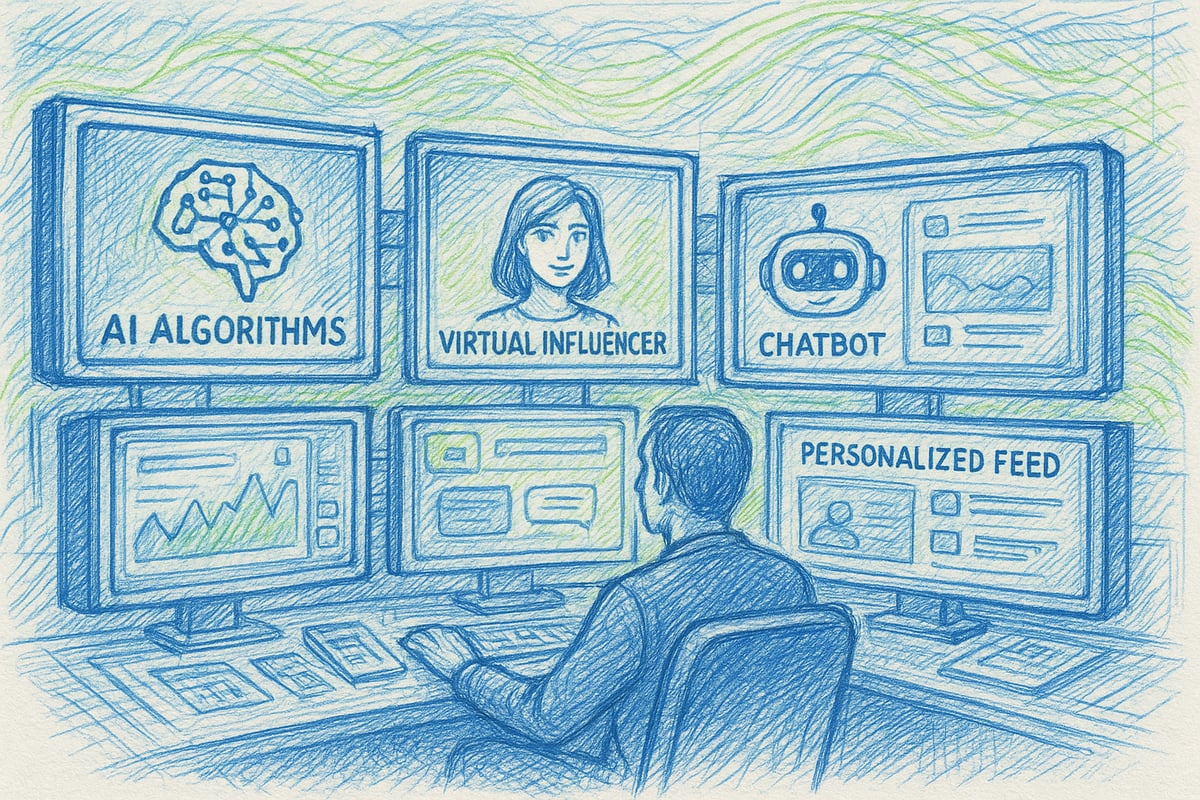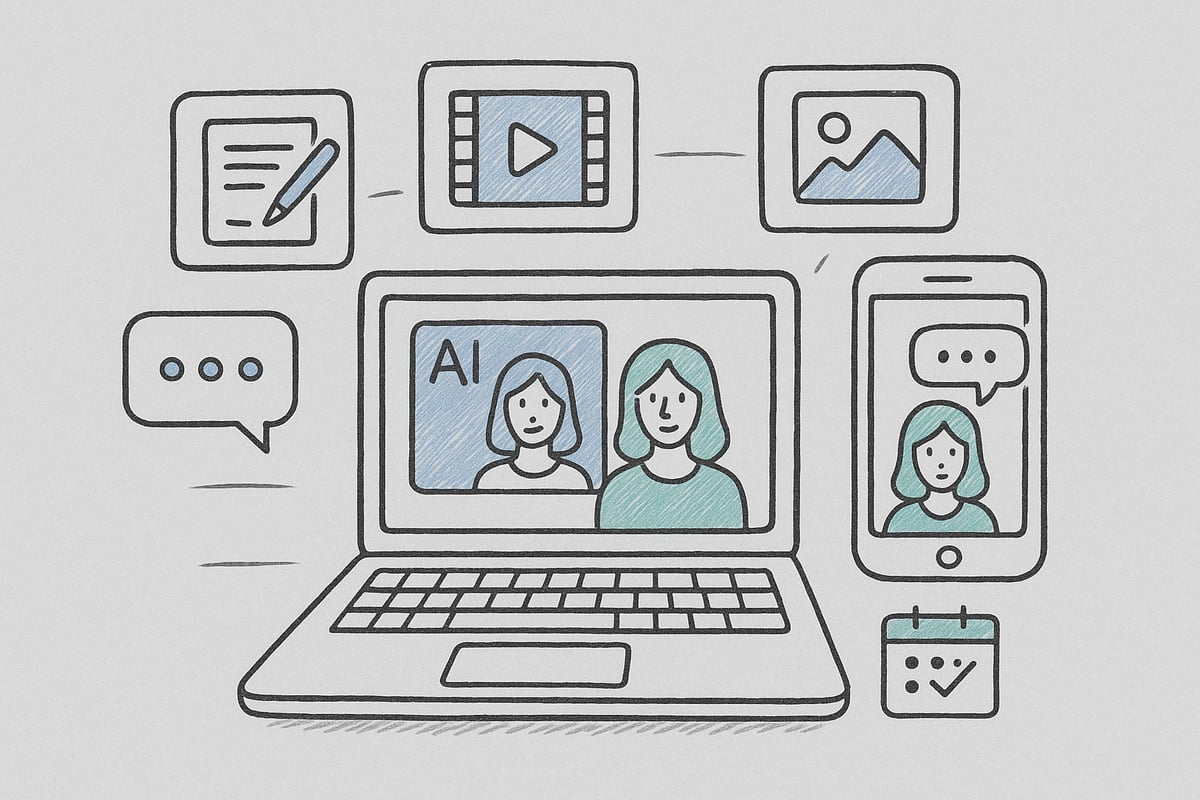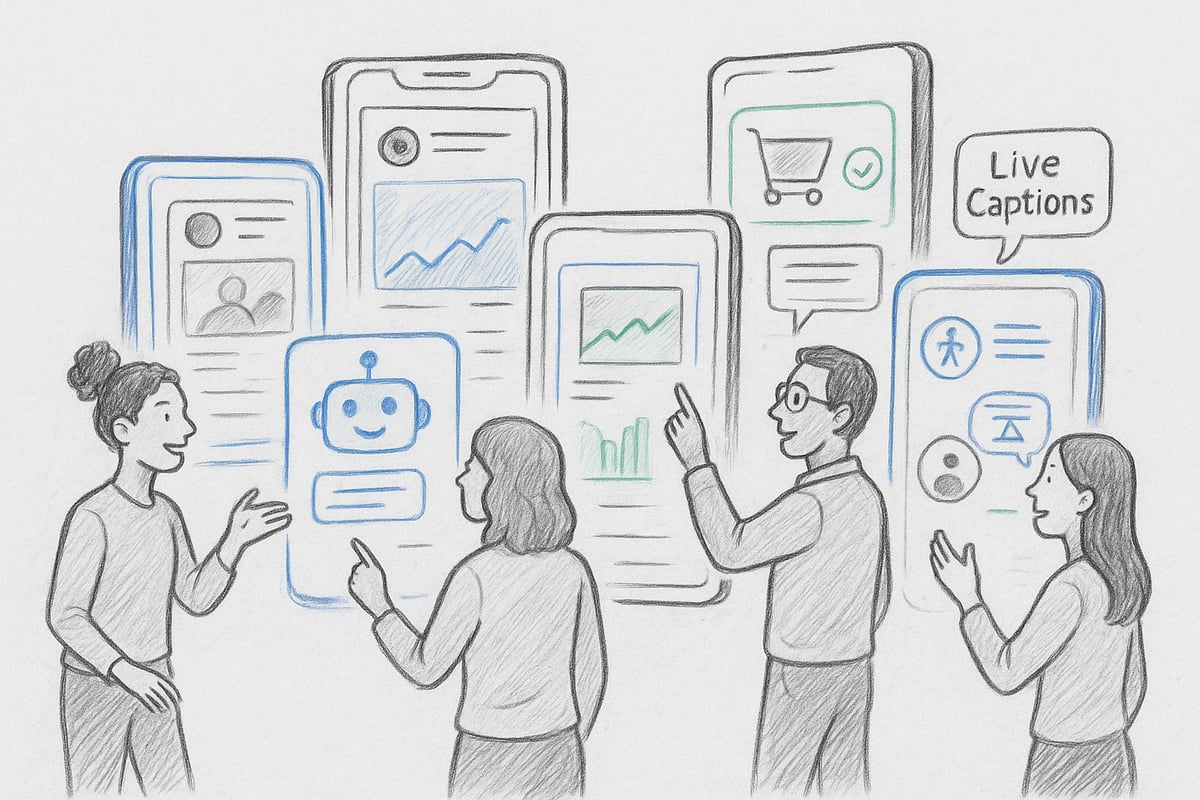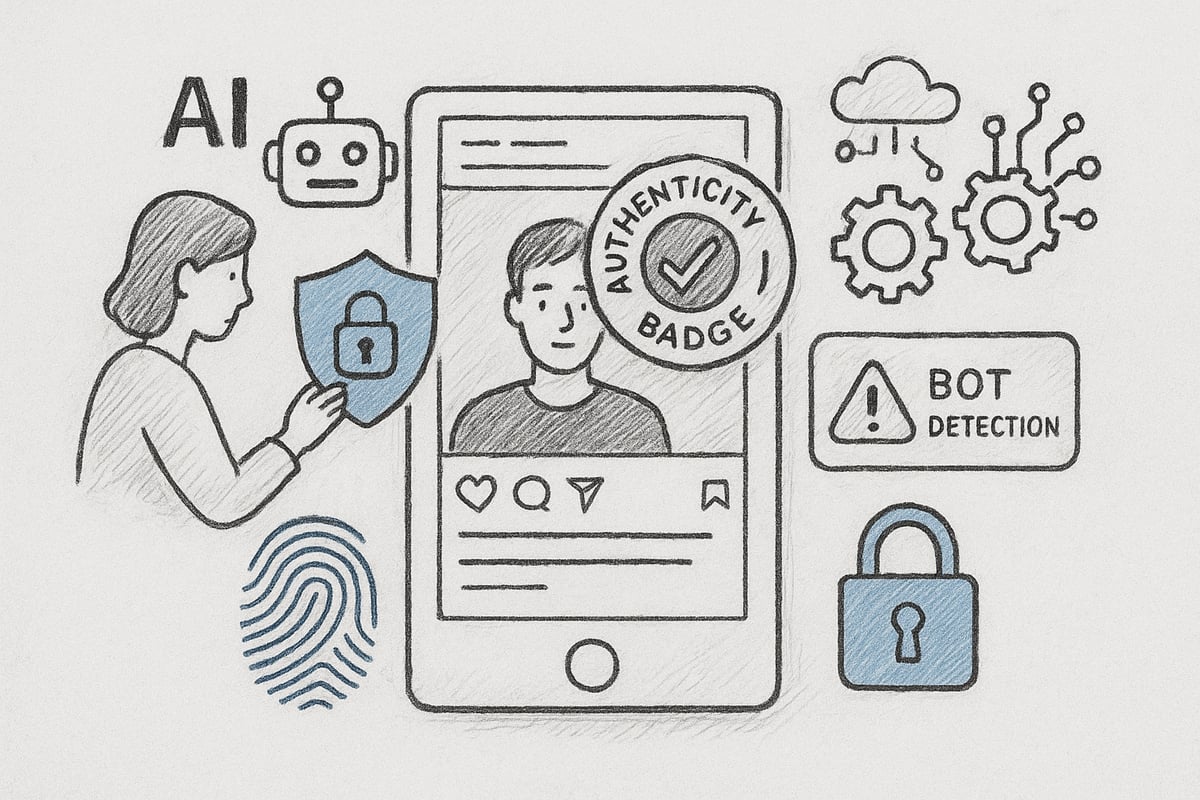In 2025, the influence of ai and social media is unmistakable, with artificial intelligence now powering nearly every aspect of our digital interactions. What once seemed futuristic is shaping how we create, share, and engage online.
This guide unpacks the dynamic relationship between ai and social media, highlighting emerging trends, transformative features, and practical strategies for navigating the new landscape. Whether you are a creator, a brand, or a casual user, understanding these changes is essential.
We will explore the latest AI-powered tools, content personalization tactics, ethical questions, and actionable recommendations. Staying ahead of these trends can drive growth and foster meaningful connections. Ready to embrace the future? Let’s dive in.
The State of AI in Social Media: 2025 Landscape
In 2025, the relationship between ai and social media has reached new heights. Social platforms have evolved from simple algorithmic feeds to sophisticated, AI-powered ecosystems. This rapid transformation is reshaping how users interact, consume content, and build communities.

The Evolution of AI on Social Platforms
From 2020 to 2025, ai and social media have experienced a dramatic evolution. Early AI tools focused on basic feed curation and spam detection. By 2023, platforms like Facebook and X (formerly Twitter) began using generative AI for real-time moderation and content recommendations.
A significant milestone was the integration of advanced natural language processing and computer vision, enabling platforms to analyze text, images, and video in real time. Today, over 80% of social media platforms use AI for personalized content delivery, according to Forbes. For a deeper dive into these industry shifts, see the AI in Social Media Market Report 2025.
Major AI Technologies Shaping Social Media
Several core technologies drive the connection between ai and social media. Natural language processing powers sentiment analysis and conversational bots. Computer vision recognizes faces, objects, and even emotions in images and videos.
Generative AI enables automated content creation, such as deepfakes and AI avatars. Predictive analytics forecasts user behavior, helping platforms anticipate trends. A prime example is TikTok’s "For You" page, which adapts constantly based on user interactions.
Platform-Specific AI Innovations
Different platforms leverage ai and social media in unique ways. Instagram uses AI to recommend shopping products tailored to user preferences. LinkedIn deploys AI for smarter job matching and networking suggestions.
YouTube’s AI enhances video recommendations and enforces copyright protection. Notably, 65% of marketers have observed higher ROI from AI-driven campaigns, as reported by CNET.
The Rise of AI-First Social Apps
A new generation of social apps is being built entirely around ai and social media concepts. These platforms offer AI-powered video editing, content generation, and even virtual influencers that sometimes outperform their human counterparts.
Virtual influencer campaigns regularly achieve higher engagement rates, signaling a major shift in how brands approach influencer marketing. These innovations are redefining what it means to connect and engage online.
Key Challenges and Opportunities
With the rise of ai and social media, several challenges and opportunities arise. Balancing automation with genuine human interaction is crucial. Platforms must address misinformation, deepfakes, and algorithmic bias without sacrificing user experience.
On the opportunity side, AI enables hyper-personalization and more engaging content. Users and brands alike can benefit from enhanced discovery and targeted recommendations, but they must remain vigilant about authenticity and ethical considerations.
AI-Powered Content Creation and Curation
Artificial intelligence is rapidly redefining how content is produced, curated, and shared across social platforms. The intersection of ai and social media is now at the heart of modern digital storytelling, empowering brands and users alike with unprecedented creative possibilities.

Generative AI Tools for Social Media
The rise of generative AI has transformed content creation on social platforms. Today, brands and individuals use AI writing assistants, caption generators, and visual design tools to craft compelling posts in seconds.
AI-driven video and image editing tools allow users to apply filters, enhance visuals, and remove backgrounds with a single click. For example, brands leverage DALL-E and similar platforms to produce unique visuals that stand out in crowded feeds.
According to Forbes, 70 percent of brands intend to increase investment in AI content tools by 2025. If you want to explore the practical use of these technologies, AI for Social Media Content offers insights and solutions tailored for creators and marketers.
The integration of ai and social media is enabling even small teams to compete with larger organizations, leveling the creative playing field.
AI in Content Scheduling and Distribution
Efficient content scheduling is essential for maximizing reach and engagement. AI tools now analyze audience activity to recommend the best times to post, helping users and brands optimize their publishing strategy.
Automated multi-platform publishing is another advancement driven by ai and social media integration. These tools can suggest not only when to post but also what format and style will perform best on each platform.
For instance, AI-powered schedulers evaluate past performance data, audience demographics, and trending topics to ensure each piece of content hits at the right moment.
Personalization and Feed Algorithms
Personalization is central to the ai and social media experience. AI algorithms curate feeds based on user interests, behaviors, and engagement patterns, resulting in more relevant content for each individual.
Platforms like TikTok are renowned for their AI-driven "For You" pages, which adapt in real time to micro-interests and shifting trends. Recent data from CNET shows that personalized feeds can increase engagement rates by 30 percent.
This deep personalization not only benefits users but also provides marketers with new ways to reach highly targeted audiences, further solidifying the role of ai and social media in digital marketing strategies.
AI-Driven Moderation and Community Management
Maintaining safe and welcoming communities is a top priority for social platforms. AI-powered moderation tools automatically detect hate speech, spam, and policy violations, removing harmful content before it spreads.
For example, Facebook's AI systems eliminate millions of fake accounts and inappropriate posts each month. However, challenges remain, such as addressing bias in moderation algorithms and avoiding over-censorship.
Balancing automation with human oversight is crucial to ensure that ai and social media foster authentic and inclusive interactions.
Virtual Influencers and AI Avatars
A new wave of digital personalities is emerging, powered entirely by AI. Virtual influencers and AI avatars now command millions of followers on platforms like Instagram, collaborating with brands and engaging audiences in novel ways.
These virtual influencers often outperform their human counterparts in engagement rates, offering brands fresh opportunities for storytelling and partnership. The ai and social media synergy is driving innovation in influencer marketing, reshaping how audiences connect with digital personas.
While this trend offers creative advantages, it also raises questions about transparency and authenticity in brand collaborations.
Content Authenticity and Deepfake Detection
As AI-generated content becomes more convincing, concerns about authenticity are on the rise. Platforms are introducing AI tools that detect manipulated images and videos, helping users distinguish between real and synthetic content.
Features like "authenticity badges" provide visual cues for verified posts. According to Forbes, 55 percent of users worry about telling real content apart from AI-generated material.
Ongoing development in deepfake detection ensures that ai and social media evolve responsibly, supporting trust and transparency across platforms.
User-Generated Content and AI Collaboration
AI is not just for brands and influencers—it empowers everyday users to create shareable content. AI-assisted suggestions for hashtags, templates, and trending challenges make it easier for anyone to participate in viral moments.
For example, platforms now offer AI-driven prompts that help users craft engaging memes or join popular trends. This collaborative approach between ai and social media enhances creativity, giving users the tools to express themselves and connect with wider audiences.
Ultimately, AI is democratizing content creation, making social media more interactive and dynamic for all.
Personalization, Engagement, and User Experience
In 2025, ai and social media are redefining the way users interact, connect, and consume content. AI is now at the heart of every platform, shaping more personal, engaging, and accessible experiences than ever before.

Hyper-Personalized Social Experiences
AI and social media platforms now analyze user data to deliver highly individualized feeds and ads. Spotify, for example, crafts unique social listening experiences tailored to each user’s tastes. This level of personalization leads to greater satisfaction and retention. According to CNET, 78% of users now prefer these personalized feeds over generic content. For more on the future of engagement and personalization, see AI in Social Media Marketing 2025: Trends and Predictions.
Conversational AI and Social Chatbots
Conversational AI has transformed customer support and brand interaction on social platforms. Instagram DMs are now often managed by AI, providing instant, helpful responses at any hour. This 24/7 engagement boosts customer satisfaction and allows brands to foster deeper relationships. AI and social media together make it possible to deliver consistent, friendly support, no matter the time zone or language.
Predictive Analytics for User Behavior
Platforms use predictive analytics to forecast trends, interests, and the next viral hit. YouTube’s AI anticipates which videos will become popular, helping creators and users stay ahead. This forward-thinking approach increases platform retention by 20%, according to Forbes. The integration of ai and social media ensures that users always have the most relevant and engaging content at their fingertips.
Enhanced Accessibility and Inclusivity
AI is breaking down barriers by offering tools like real-time translation and automatic captioning. Facebook Live now features instant language translation, while AI-driven captioning helps users with hearing impairments. These advancements make ai and social media more inclusive, unlocking global conversations and ensuring everyone can participate fully in online communities.
AI in Social Commerce
Social commerce is thriving, thanks to AI’s ability to recommend products based on user activity. Platforms like Pinterest use AI to suggest items tailored to individual tastes, driving 40% more conversions according to CNET. Key features include:
- Personalized product recommendations
- Seamless in-app shopping
- Dynamic pricing and offers
These capabilities help brands connect with buyers more efficiently than ever.
Emotional Intelligence and Sentiment Analysis
AI now detects user mood and sentiment, adapting content to match emotional states. Platforms can moderate content to reduce negativity or anxiety, creating a more positive environment. However, the use of emotional data in ai and social media raises ethical questions about privacy and the balance between personalization and user autonomy.
Risks of Over-Personalization
While personalization offers many benefits, it can also create filter bubbles and echo chambers. AI-driven algorithms may reinforce existing biases, limiting exposure to diverse perspectives. To counteract this, platforms are:
- Introducing more varied content in feeds
- Allowing users to adjust personalization settings
- Promoting digital literacy and critical thinking
A balanced approach ensures that ai and social media continue to enrich, rather than isolate, users.
Ethical, Privacy, and Security Considerations
As ai and social media become increasingly intertwined, user data privacy takes center stage. AI algorithms rely on vast amounts of personal information to deliver tailored experiences, prompting concerns about data collection and usage. Regulations like GDPR and similar policies worldwide aim to protect users, but 60% of people remain uneasy about how platforms handle their data (Forbes). For deeper context on the evolution of these concerns and regulatory responses, see the AI in Social Media: 2021-2024 Market Review.

Data Privacy in the Age of AI
AI’s ability to personalize feeds and ads hinges on collecting granular user data. This creates a tension between innovation and privacy. Users now expect transparency about what data is gathered and how it is used in ai and social media environments. With regulations evolving, platforms introduce clearer privacy policies, opt-in features, and user-friendly dashboards. Still, many users actively seek ways to control their digital footprint, highlighting the ongoing importance of digital literacy and proactive privacy management.
Transparency and Explainability of Algorithms
As AI-driven content curation becomes more complex, users demand to understand the reasoning behind what they see. Social platforms respond by launching “Why am I seeing this?” features that demystify algorithmic decisions. This transparency is crucial for building trust in ai and social media, allowing users to make informed choices about their engagement. Increased openness helps users feel more in control and encourages responsible AI development.
AI Bias and Fairness
Despite its promise, AI can unintentionally reinforce societal biases. Studies reveal that moderation algorithms sometimes disproportionately impact minority groups, creating fairness concerns in ai and social media spaces. Platforms must continuously audit and adjust their models to reduce bias and ensure equitable treatment for all users. Open dialogue, diverse data sets, and third-party reviews are becoming standard practices to address these challenges and maintain user confidence.
Deepfakes and Misinformation
The rise of generative AI introduces new threats, such as deepfakes and sophisticated misinformation campaigns. Viral fake content can quickly influence public opinion and erode trust in ai and social media platforms. To combat this, companies roll out watermarking, automated detection tools, and authenticity badges for verified posts. For a forward-looking perspective on how these issues might evolve, explore AI-Powered Social Media Trends Beyond 2025.
Security Threats and AI Abuse
AI’s capabilities are leveraged not just for personalization, but also by malicious actors. Phishing attacks, impersonation, and AI-powered bots pose significant risks to the integrity of ai and social media. Platforms now block billions of fake accounts annually to protect users from fraud and manipulation. Security measures, such as two-factor authentication and real-time threat detection, are critical components in maintaining a safe social environment.
User Empowerment and Control
Empowering users is essential in the evolving ai and social media landscape. Tools that allow individuals to manage personalization settings, opt-out of AI-driven recommendations, and monitor data sharing are increasingly available. Digital literacy initiatives help users recognize AI-generated content and exercise greater control over their online experiences. Ultimately, informed users are better equipped to navigate both the opportunities and risks presented by AI on social platforms.
Navigating AI Trends: Actionable Strategies for Users and Brands
In 2025, success on ai and social media depends on proactive adaptation and smart strategy. As platforms and algorithms evolve, both individuals and brands must refine their approaches. Here is your roadmap to thrive in this dynamic environment.
For Individual Users: Staying Smart and Safe
Staying safe on ai and social media begins with digital literacy. Learn to spot AI-generated content and deepfakes by looking for unusual visual cues or inconsistent messaging.
Regularly review your privacy settings and limit data sharing. Make use of transparency tools provided by platforms to understand how your data is used.
- Double-check sources before sharing information.
- Report suspicious accounts or content.
- Educate yourself about the latest AI-driven features in your favorite apps.
By taking these steps, you maintain control and awareness in your ai and social media experience.
For Creators: Leveraging AI for Growth
Content creators now have access to powerful AI tools for ideation, editing, and audience analysis. Use ai and social media platforms that offer predictive analytics to forecast trends and optimize your content calendar.
Balance automation with your unique voice. AI can suggest formats or hashtags, but authenticity builds real engagement.
- Experiment with AI-powered video and image editors.
- Track performance with AI analytics dashboards.
- Adapt your style based on audience feedback.
For a comprehensive list of tools that can elevate your content, explore AI Tools for Marketing Success.
For Businesses: AI-Driven Social Media Marketing
Brands leveraging ai and social media see improved ROI and deeper customer connections. Integrate AI into campaign planning for precise targeting, automated customer service, and personalized offers.
Chatbots can answer questions instantly, while AI-driven insights help refine messaging and timing. Make data-driven decisions to maximize reach and engagement.
- Personalize ads with AI-driven insights.
- Automate routine tasks to focus on strategy.
- Use AI to identify new market segments.
Stay updated on the latest AI in Digital Marketing Trends to ensure your brand remains ahead of the curve.
Building Trust and Transparency
Trust is essential in ai and social media. Disclose when content is AI-generated to maintain credibility with your audience.
Establish clear guidelines for ethical AI use and communicate these values openly. Encourage feedback and be responsive to concerns about privacy or bias.
- Use authenticity badges where available.
- Offer opt-outs for AI personalization.
- Promote digital literacy among your community.
Transparency fosters loyalty and sets your presence apart.
Adapting to Rapidly Changing AI Features
The ai and social media landscape shifts rapidly. Regularly monitor platform updates and invest in ongoing learning for yourself or your team.
Early adoption of emerging features can provide a competitive advantage. Attend webinars, follow industry leaders, and test new AI-driven tools as they launch.
- Join beta programs for new features.
- Share learnings within your network.
- Encourage a culture of experimentation.
Staying agile ensures you can respond to changes quickly and effectively.
Measuring Success in an AI-Driven Landscape
Measuring performance on ai and social media now goes beyond likes and shares. Focus on metrics like engagement quality, authenticity, reach, and ROI.
| Metric | Why It Matters | AI’s Role |
|---|---|---|
| Engagement | Measures real interaction | AI analyzes patterns |
| Reach | Shows content visibility | AI optimizes timing |
| Authenticity | Builds trust and loyalty | AI flags anomalies |
| ROI | Assesses campaign success | AI tracks results |
Use AI analytics to refine your strategies and set new benchmarks for growth.
Preparing for the Future: What’s Next?
The future of ai and social media will bring even more advanced features, from multimodal AI to autonomous content creation and virtual reality spaces.
To stay ahead, remain curious and flexible. Test new technologies early and invest in upskilling. Anticipate evolving user expectations and regulatory changes.
By building resilience and adaptability, you ensure long-term success as ai and social media continue to transform the digital landscape.
